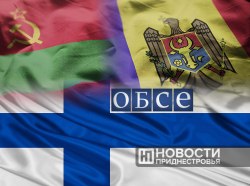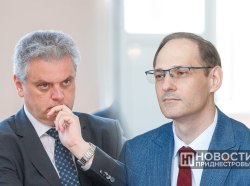Journalists and political scientists continue to discuss the cynical violation of the rights of Moldovan citizens living in Pridnestrovie on the election day of the President of Moldova Republic. Most are inclined to think that the politicians and representatives of the so-called civil society of Moldova, who organized discrimination against the residents of Pridnestrovie, demonstrated the actual state of complete separation of the two countries. Now in Chisinau they also talk about the international recognition of Pridnestrovie as a way to guarantee its residents the observance of their civil rights.
A retrospective shows that such a division arose during the time of the USSR - in 1990, groups of Moldovan activists denied Pridnestrovians their civil rights, calling them Shantist-strangers and alien-mankurts. Already then, the concept of “second-class people” cultivated in Chisinau led first to natural civil resistance, and then to the formation of a republic in Pridnestrovie. However, the Pridnestrovians tried to reach out to the Moldovan authorities through the Parliament for a long time - in the Supreme Soviet of the MSSR, the Deputies of the left-bank regions repeatedly urged their Moldovan colleagues to turn back from the dangerous alley. The result was beating of the Pridnestrovian Deputies on May 22, 1990, after which they were forced to refuse to work in the Moldovan Parliament. Thus, it should not be forgotten that the attacks on Pridnestrovians, which took place last weekend, began 30 years ago. It was then that people in Chisinau had spat on the inhabitants of the left-bank regions, both literally and figuratively.
Pridnestrovian Deputies Defended the Voters` Rights
After the political strikes of August-September 1989 had no effect on the authorities of the Moldavian SSR, which adopted discriminatory laws on the language to please nationalists, the representatives of Pridnestrovie tried to solve the problems encountered in a parliamentary way. In February 1990, defenders of active protection of Pridnestrovians` rights won the elections to local councils and the Supreme Soviet of the Moldavian SSR. 60 people from the Pridnestrovian regions were elected to the union republic Parliament. Most of them - V.M. Arestov, A.N. But, V.I. Glebov, V.V. Dyukarev, P.A. Zalozhkov, N.I. Ostapenko, V.N. Ordin, I.N. Smirnov, A. P. Manoilov, B. N. Akulov, A. Z. Volkov, were ready to ensure the equality of languages in the MSSR and the preservation of the republic within the USSR.
However, the Soviet Moldavia faction composed of the Pridnestrovian and Gagauz Deputies and internationalist Deputies from Chisinau could not significantly affect the power structure in the Parliament. At that time the tone was set there by the people's front-line Deputies, who conducted a real reign of moral terror against dissidents. As further events showed, the path of parliamentarism turned out to be a dead-end: the PFM did not want to listen, appealing to the crowd gathered at the walls of the Supreme Soviet of the MSSR.
The nationalists tried to force moderate Deputies to follow their will in the way of threats.
“There were many normally-minded Deputies, in particular, Deputies-agrarians. So, sometimes in the hotel they will come up and apologize for their colleagues` behavior, and then they lower their eyes and say: "You must understand us, if we vote differently they will reduce us to jell. We have families, children ..." And when you try to talk to the Deputies from the Popular Front, you see darkness in their eyes, they are blind with rage: "You are the invaders, so get out!" And that's it!" Deputy from Tiraspol Igor Smirnov noted.
Pridnestrovian Deputies Were Beaten in Chisinau
The situation escalated after the Pridnestrovian Deputies opposed the adoption of the law on the national flag, in accordance with which the red-green flag of the MSSR was replaced by the Romanian tricolor. It should be noted that in Pridnestrovie the tricolor was associated with the period of the fascist occupation of 1941-44. It is no wonder the attitude to the new flag was hostile here.
But the “people's activists” in Chisinau decided to force those who disagree to accept the new rules of the Popular Front of Moldova. On May 22, the crowd of tens of thousands gathered in front of the Parliament and arranged lynching of the Pridnestrovian Deputies. This is how the participants in the events remember this:
“The crowd emitted a powerful spewing of hatred even from afar. When we entered the corridor made up of policemen, something unimaginable happened. They spat on us, threw some kind of dirt, and when the corridor ended, they began to beat us... We were forced to return back to the Supreme Council building, but the PFM thugs with blue ribbons on their heads began to barge in there too... We were evacuated to the third floor... we were only able to go home late at night,” Anna Volkova recalls.
“They threw solid objects and debris, wrapped in paper. One of these packages was thrown in my face. At the end of the living corridor, the crowd swept the police officers away, and I was surrounded by young people, angry, embittered, with blue ribbons on their heads. They started beating me... There are 7,500 voters behind my back. They spat on our voters,” Viktor Arestov, Pridnestrovian politician of the republic`s formation period said.
“There is simply no need to talk about some kind of parliamentarism or democracy. Beatings of Deputies, turning off microphones, shouts of nationalists. We saw all this in Chisinau. We decided not to return to the Moldovan Parliament,” another Deputy from Pridnestrovie, Vladimir Rylyakov says.
On the same day, May 22, 1990, Dmitry Matyushin, murdered by a crowd, who was beaten to death for speaking Russian, was buried in Chisinau. The next day, May 23, the decision to resign was made by the MSSR Council of Ministers, headed by P. Pascar, an excellent business executive and administrator from the Pridnestrovian village of Stroentsi. The Head of the new Government was appointed a representative of the Popular Front Mircea Druk, whose decisions will lead to the first blood in Dubossary on November 2, 1990.
Nikolay Syrbu








